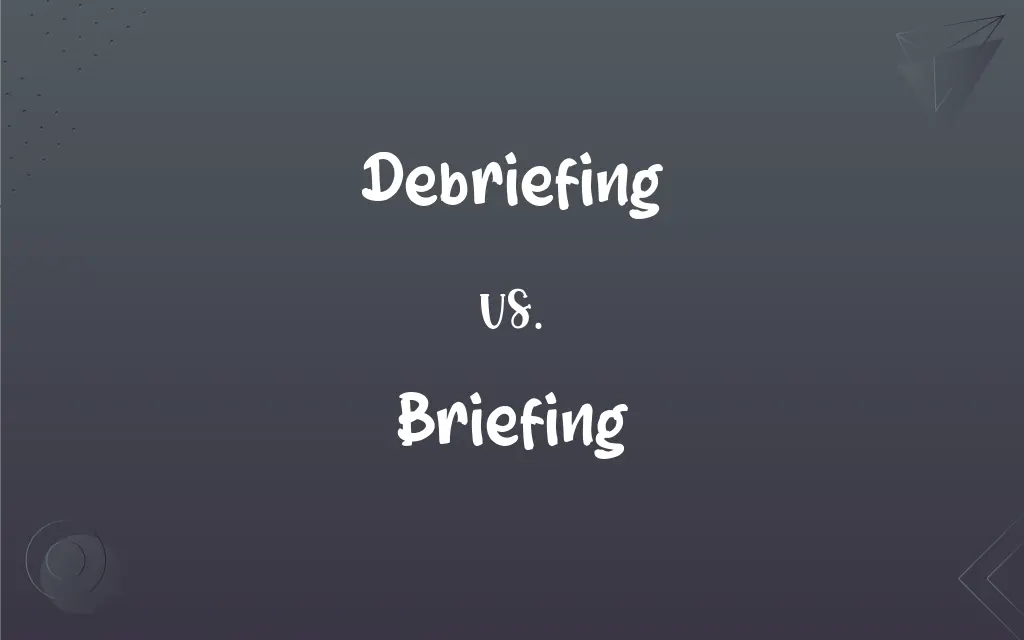Debriefing vs. Briefing: What's the Difference?
Edited by Aimie Carlson || By Harlon Moss || Updated on November 7, 2023
Debriefing is the process of reviewing and discussing after an event or activity, while briefing is providing information or instructions beforehand.

Key Differences
Debriefing is a retrospective discussion, typically held after the completion of a task or event. It's used to analyze performance, outcomes, and to glean lessons learned. Briefing, however, is preparatory; it provides necessary information before the start of an activity or mission.
A briefing aims to inform, instruct, or update individuals on specific information related to an upcoming event or task. It sets expectations and outlines roles. Debriefing, on the other hand, involves collecting feedback and insights after an event to improve future performance.
During a debriefing, participants may share experiences, successes, and failures to enhance understanding and learning. A briefing is less interactive, often consisting of a one-way communication where the leader presents information to the attendees.
Debriefing can be an essential tool for continuous improvement in various fields, such as military operations, medical procedures, and corporate projects. Briefings are essential for planning, strategy, and ensuring that all participants are on the same page before commencing an activity.
The key difference lies in the timing and purpose: debriefing is after the fact and is reflective, while briefing is anticipatory and instructional. Both are critical for the effective execution and analysis of operations in any organized setting.
ADVERTISEMENT
Comparison Chart
Purpose
To review and reflect on an event or activity
To provide information or instructions beforehand
Timing
Post-event
Pre-event
Nature
Often conversational and reflective
Typically instructive and directional
Objective
To learn from the experience
To prepare for the experience
Direction of Communication
Typically two-way, with feedback and discussion
Usually one-way, with information delivery
ADVERTISEMENT
Debriefing and Briefing Definitions
Debriefing
Discussion to analyze performance.
The surgical team's debriefing focused on improving patient outcomes.
Briefing
A meeting to give information or instructions.
The crew received a briefing before the flight.
Debriefing
A meeting for reflective learning.
The debriefing at the end of the project helped identify key issues.
Briefing
The act of informing someone before an event.
She attended a briefing on the new company policy.
Debriefing
The process of questioning after an event.
The soldiers underwent a debriefing after their mission.
Briefing
Presentation of preparatory guidelines.
There will be a briefing for all volunteers tomorrow morning.
Debriefing
Reporting results and experiences.
After the conference, the team had a debriefing session.
Briefing
Providing updates or status reports.
The manager held a daily briefing with the team.
Debriefing
Gathering insights post-activity.
The debriefing revealed several opportunities for improvement.
Briefing
Delivering essential information succinctly.
The lawyer gave a briefing on the case's main points.
Debriefing
The act or process of debriefing or of being debriefed.
Briefing
The act or an instance of giving instructions or preparatory information to someone.
Debriefing
The information imparted during the process of being debriefed.
Briefing
A meeting at which such information is presented.
Debriefing
The act of debriefing, or the state of being debriefed.
Debriefing
The report of a mission or project, or the information so obtained.
Debriefing
Present participle of debrief
Debriefing
Report of a mission or task
FAQs
Can debriefing be used for training?
Yes, it's an effective tool for learning from experience.
What typically happens during a debriefing?
Participants discuss outcomes and share feedback.
Who conducts a briefing?
Usually a leader or expert with pertinent information.
When should a briefing be held?
Before the start of an event or task.
Is a briefing always formal?
It can be formal or informal, depending on the context.
Can debriefing improve team performance?
Yes, by fostering learning and cohesion.
Are debriefings confidential?
They often are, especially in sensitive professions.
What is the purpose of a debriefing?
To review events and gather insights for improvement.
What makes an effective debriefing?
Open communication and a focus on lessons learned.
What's the outcome of a successful debriefing?
Enhanced knowledge and strategies for future activities.
Is a briefing necessary for all types of events?
It's beneficial for any event requiring preparation.
Should a briefing include a Q&A session?
It can, to ensure clarity and understanding.
What should be the focus of a briefing?
The focus should be on upcoming tasks and expectations.
How detailed should a briefing be?
Detailed enough to ensure readiness and understanding.
Can a debriefing be skipped?
It's not recommended, as it's crucial for growth and development.
What's the best time for a briefing?
Shortly before the event, when the information is most relevant.
Does a briefing need to cover background information?
It should cover all necessary context for clarity.
How to make a briefing engaging?
Use clear, concise language and visual aids if needed.
How does debriefing affect decision-making?
It can lead to more informed decisions in the future.
Who should be involved in a debriefing?
All who participated in the event or activity.
About Author
Written by
Harlon MossHarlon is a seasoned quality moderator and accomplished content writer for Difference Wiki. An alumnus of the prestigious University of California, he earned his degree in Computer Science. Leveraging his academic background, Harlon brings a meticulous and informed perspective to his work, ensuring content accuracy and excellence.
Edited by
Aimie CarlsonAimie Carlson, holding a master's degree in English literature, is a fervent English language enthusiast. She lends her writing talents to Difference Wiki, a prominent website that specializes in comparisons, offering readers insightful analyses that both captivate and inform.






































































